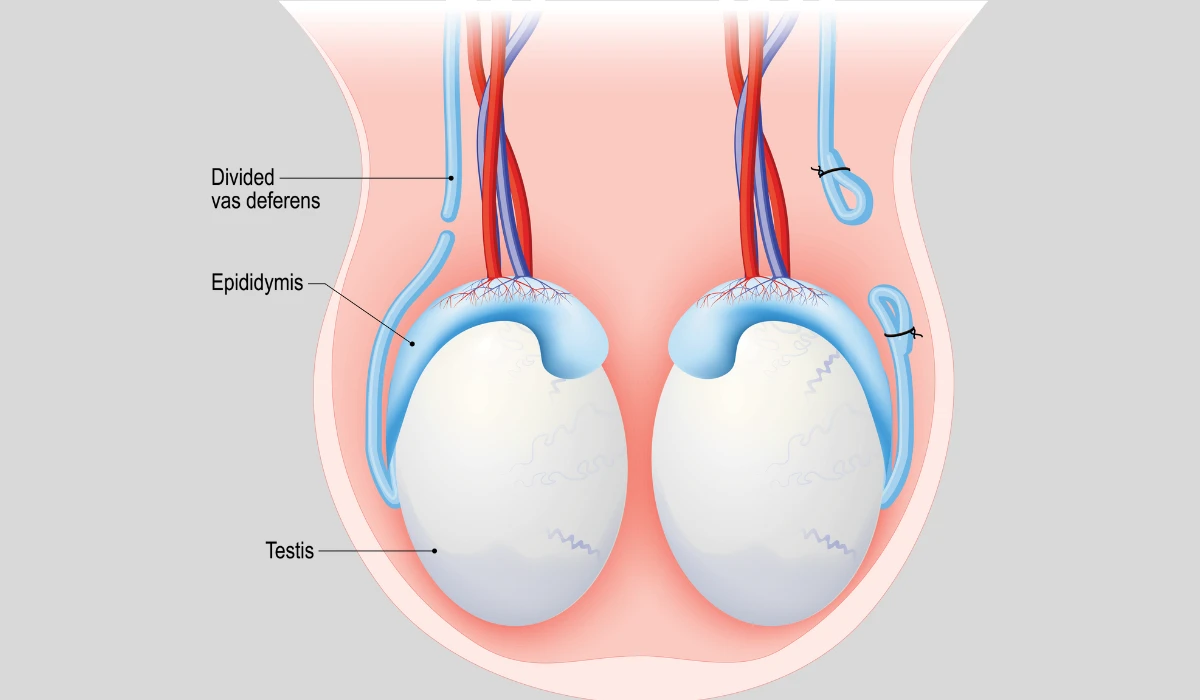Are you concerned about the side effects and health issues caused by vasectomy? Then you are at the right place. Here, we are going to discuss the impact of the vasectomy procedure on men’s health and examine whether it has a connection with reproductive health.
This is a common doubt among men who are planning to undergo vasectomy treatment. However, this treatment has its own risk factors. We cannot neglect the negative and positive sides of this treatment.
In this article, let’s discuss vasectomy and related health issues. Here, we aim to clear all the doubts about vasectomy. Each section aims to deal with different factors that are linked with vasectomy. We will be discussing all the misconceptions about vasectomy.
After reading this article, you can decide your reproductive choices better. Let’s get started.
What is a vasectomy?
Vasectomy is a medical procedure that involves surgical interruption of the vasa deferentia. This is a safe and effective form of contraception for couples who don’t want to have more children.

This process takes less than 30 minutes and requires local anesthesia. Vasa Deferentia is a coiled tube that carries sperm which is found within the scrotum. This is the tube through which sperm passes out of the body.
In this process of vasectomy, Vasa Deferentia is sealed off or occluded to stop the flow of sperm. After vasectomy, the testicles still produce sperm but cannot be ejaculated during intercourse. The sperm are reabsorbed by the body and this does not affect the erection of the individual.
Does vasectomy lower testosterone levels?
Testosterone is a male hormone that plays an important role in body functions. It affects from height to muscle mass in men. The main duty of testosterone is to regulate the functions of sex organs.
This hormone helps increase libido, develop male sex characteristics, and more. Low levels of testosterone may be the reason for a lot of problems, such as erectile dysfunction, depression, fatigue, weight gain, decrease in bone density, and low energy.
No evidence suggests that vasectomy lowers the testosterone levels. There is a common misconception that vasectomy may lower testosterone levels, as a result, it lowers sex drive, negatively affects body functions, and so on.
However, scientific research has shown that this is not true. This procedure is only linked with permanent birth control. Studies show that there is no significant difference in the testosterone levels in post-procedure. However, vasectomy does not affect the ability of testicles to produce testosterone in the body.
What changes does vasectomy bring to the body?
Vasectomy is a surgical procedure, but it does not have an immediate effect on one’s health. It may cause mild side effects or drug interaction in some men. However, health issues may vary from person to person due to the influence of several factors. It is necessary to consult a doctor if a person experiences more side effects or other health issues.
Vasectomy does not have a big impact on the body. This is a reproduction control method that does not affect sex life or sexual performance. However, all medical procedures have their own risk factors. If we take hormonal changes, this procedure may cause slight changes in hormone levels. But this is not a long-term change.
A vasectomy is a form of male sterilization which stops sperm from mixing with the seminal fluid. Vasectomy may cause bleeding or infection, swelling in the scrotum, pain in the testicles, fluid buildup in the testicles, and other mild health issues that are obvious in any medical procedure.
Recent studies show this procedure does not affect the sexual functions in men. Your reproductive system will not be harmed by vasectomy, and there is minimal sexual dysfunction risk.
How to improve testosterone levels in men?
If you think that testosterone is produced only in men, then it is not the case. This hormone is produced in women in small amounts. However, testosterone is an important hormone in males that can affect emotional, physical, and sexual functions in males.
The levels of this hormone may lower due to several factors. There are many natural ways to improve testosterone production in the body. Here are some tips that help improve hormone levels.
Considering the above tips helps you to improve testosterone levels in the body naturally. It is important to maintain a normal level of testosterone in men’s bodies. Although many medications and pills help to increase testosterone levels, it will be safer to follow the natural methods.
Conclusion
After detailed research and analysis of vasectomy, it is clear that vasectomy is a surgical process that does not lower testosterone levels in the body. After this process, men can still enhance their sexual satisfaction without worrying about their health. All we have to understand is that this process helps permanently prevent pregnancy.
People think that vasectomy may harm their sexual health by reducing sexual hormones. The fact is that no evidence suggests that vasectomy lowers testosterone levels in males and causes sexual decline.
Men can still have sexual satisfaction after this procedure. The only intent of vasectomy is to seal the tubes that carry sperm into semen.
Health reports of men after having vasectomy suggest that it does not cause long-term health complications. However, this is a surgical procedure, and some experienced infection, pain, or discomfort in the operation area.
It is necessary to make regular visits to the doctor for follow-ups regarding the procedure. If you had a vasectomy and have any pre-existing health condition like diabetes, blood pressure, cholesterol, or others, it suggests you follow the instructions of the doctor to recover from the effects of surgery.
However, vasectomy is an expensive procedure that all cannot afford. We hope this article clears the misconceptions regarding vasectomy and testosterone.

